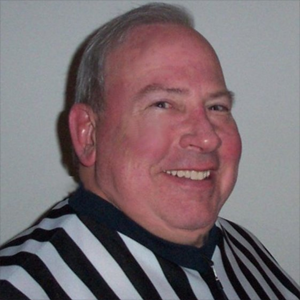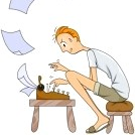
Rndballref
20 Years Experience
Chicago, IL
Male, 60
For twenty years I officiated high school, AAU and park district basketball games, retiring recently. For a few officiating is the focus of their occupation, while for most working as an umpire or basketball referee is an avocation. I started ref'ing to earn beer money during college, but it became a great way to stay connected to the best sports game in the universe. As a spinoff, I wrote a sports-thriller novel loosely based on my referee experiences titled, Advantage Disadvantage
In each half, when an opponent has committed the 7th team foul, the player is awarded a 1 and 1 for non shooting common fouls. When that opponent has committed its 10th team foul the player is awarded 2 free throws for non shooting common fouls.
Regardless of the team foul count on shooting fouls, if the basket was made the shooter gets 1 free throw. If the basket was not made on a shooting foul the shooter is awarded 2 or 3 free throws depending on where the shot was attempted.
I think 2 referees can handle middle school games. Most high school underclass games use 2 officials. Schools are stretching their budgets, they have better things to spend money on.
There is an exception to my opinion, and that is if the 3rd official is training and being mentored by the other 2 then there is value for the trainee but not necesarily for the game itself.
There is no prohibition in the NFHS rule book prohibiting relatives officiating a game. However, good sense should prevail. My state asks what schools an official is affiliated with to avoid conflicts of interests but that is for the state playoff system only. This should be avoided whenever possible.
The in bounder has 5 seconds to release the ball. The restriction is satisfied as soon as he releases the throw in.
"The Onion" Contributors
 What's your favorite Onion headline of all time?
What's your favorite Onion headline of all time?
CPR Trainer
 Just how effective is the Heimlich, really?
Just how effective is the Heimlich, really?
Casino Marketer
 What would be some less obvious ways someone could save money on a Vegas trip?
What would be some less obvious ways someone could save money on a Vegas trip?
Usually, the refs will allow a slight sliding once a diving player has possession. But as soon as a player rolls over it is travelling.
The ref is part of the floor. If the ball bounces off a ref, it is ruled based on where the ref is standing. If the ref is standing one foot out of bounds and player causes the ball to hit the ref it is ruled out of bounds (even if the ball never crossed the line). Likewise if the ref is legally in bounds and the ball hits him, play on. Think hockey.
Assuming no body contact, the foul.no foul call would be because of illegal use of hands. That includes the follow through on a shot. One caveat is that if an offensive player has her hand on the ball it is not a foul for the defender to contact that hand (not the arm or wrist).
I am not sure I have answered your question, maybe you can spell out more specifically what kind of action you are concerned about?
-OR-
 Login with Facebook
Login with Facebook (max 20 characters - letters, numbers, and underscores only. Note that your username is private, and you have the option to choose an alias when asking questions or hosting a Q&A.)
(A valid e-mail address is required. Your e-mail will not be shared with anyone.)
(min 5 characters)
By checking this box, you acknowledge that you have read and agree to Jobstr.com’s Terms and Privacy Policy.
-OR-
 Register with Facebook
Register with Facebook(Don't worry: you'll be able to choose an alias when asking questions or hosting a Q&A.)